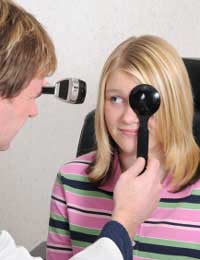First Trip to the Optician

Eye tests are crucial for children to ensure they develop both academically and socially to the best of their ability. The eyes are still developing up until the age of 7 so it is important to pick up any problems early and treat them before any damage becomes permanent.
Help from the NHS
All children under the age of 16 and those under 19 who are in full-time education are entitled to a free NHS sight test. Children are also entitled to a voucher to help with paying for glasses. There are many types of frames available which are within the voucher value and are suitable for children so there are plenty to choose from, but you can also use them towards the cost of other pairs.Children may not complain of problems with their sight as they will not have anything to compare poor vision with. Many eye conditions do not have any symptoms so it is important to have regular eye tests to ensure your child’s eyes are healthy.
When Should your Child Visit the Optician?
A baby’s vision is checked at six weeks and again at around 3 years old. This will not be a full eye examination that adults undergo but will check the eyes are developing correctly. The pupils are checked to ensure that they open and close properly in different light conditions. Checks that the eyes can fixate and follow an object are also carried out. The age when eye checks are carried out on babies can vary in different parts of the country. If you are worried about your baby’s vision ask your GP or optician for advice.There has been a lot of debate about when a child’s eyes should be checked again. Every child should visit the optician at least by the time they start school.
Tests
When you take your child to the optician for the first time, reassure them that the tests will not hurt and that there is nothing to worry about. It is best to book an appointment at a time when your child is usually alert and happy. The optician will carry out a number of tests to check their near and distance vision, their binocular coordination, their eye movement skills, their ability to focus, their peripheral vision and their eye and hand coordination. If any problems are detected they may refer your child to an ophthalmologist at the hospital eye clinic.Children do not have to be able to read to have an eye test. The optician will have special equipment for children and a special chart. They have eye charts which use pictures rather than letters.
Always tell the optician if you have noticed any signs such as rubbing their eyes, sitting very close to the television, difficulty concentrating or blinking a lot. It may not be anything serious but the optician will check everything out. It is also important for the optician to know if there is a family history of eye problems, particularly if there is a history of lazy eye, squint, short or long sightedness or other eye conditions.


Re: Contact Lens Trials Explained
Hi Please could you put me in touch with your wholesale/distribution department. Which countries do you currently…
Re: What is Vitrectomy Surgery?
I had vitrectomy 4 weeks ago. The surgery was not well done as apparently bleeding occurred. The hole did not close despite having…
Re: Glasses or Contacts?
I need a eye exam and new glasses it's been since 2013/ I have no income I lost my boyfriend last September and I've been homeless ever…
Re: Eyewear for the Partially Sighted
This extract from your text is not clear and the grammar is poor- and the letters in the validation box are mixed…
Re: Eye Cancer Symptoms
I have yellow in both eyes lools like 2 dots. But looks like its makin the white part of my eye yellow whats wrong with me
Re: Are my Glasses Affecting my Eyes?
Hi, Please can anyone give advice on wearing varifocals. After a short while I develop a severe ache in my left eye and…
Re: Are my Glasses Affecting my Eyes?
On wearing my new varifocals, I am finding that my left eyeball hurts so much it feels like it will explode after 15…
Re: What is the Cause of my Itchy Eye?
I have One and only One itchy eye that has been going on 24/7 for 5 weeks.Eye is not swollen vision not affected. Eye doc…
Re: Contact Lens Trials Explained
Hi, We wanted to get in touch with you to increase traffic on your website. Please reply to this email so we can send you free…
Re: What Are Photoreceptors?
I have a 10 year old grandson who was diagnosed at apx 2 with cone and rod dystrophy eye disease. Please help with any treatment…